Tuesday, January 4 - More Science on the Oden
The Oden is currently carrying 30 scientists working on 8 different Antarctic research projects. I've already shared about my sea ice team and our project, so now I would like to tell you about another interesting research project underway on the Oden. Dr. Rebecca Dickhut, Co-Chief Scientist on the Oden, and graduate student Emily Brault, both from the Virginia Institute of Marine Science, are studying the persistent organic pollutants (POPS) found in the Antarctic marine food web. Their research project, entitled Persistent pollutants in the Antarctic marine foodweb: Impact of climate change and insights into the feeding ecology of apex predators involves using chemical tracers to evaluate the feeding ecology of marine mammals and examining the impact of climate change on the amount of POPS possibly entering the ocean through glacier meltwater.
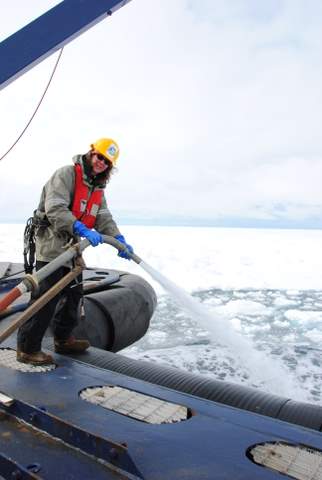 Dr. Rebecca Dickhut uses the Oden's firehose to keep ice off of the plankton net.
Dr. Rebecca Dickhut uses the Oden's firehose to keep ice off of the plankton net.
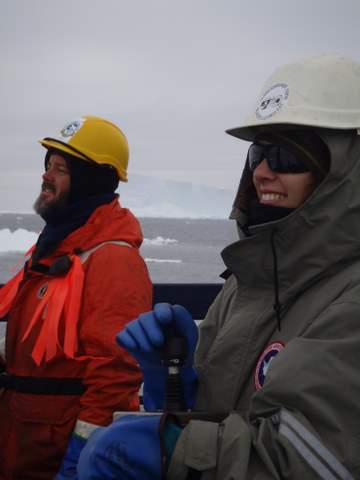 Emily Brault controls the winch which raises and lowers the plankton net while Jeremy Lucke looks on.
Emily Brault controls the winch which raises and lowers the plankton net while Jeremy Lucke looks on.
Rebecca and Emily are collecting phytoplankton (microscopic plant plankton), zooplankton (Animal plankton), and krill from different areas along our cruise track. They will be comparing the amount of man-made pollutants (such as DDT) found in the phytoplankton, zooplankton, and krill found in areas with high glacial melting (more freshwater from glaciers melting) like the Antarctic Peninsula to areas with less glacial melting like the Ross Sea. Because the freshwater is less dense than sea water, it stays at the water surface until it mixes and disperses. The persistent organic pollutants (POPS) in the fresh water are absorbed the phytoplankton which are found near the top of the water column, Then zooplankton and krill eat the phytoplankton, consuming the POPS, and penguins and whales eat the zooplankton and krill. If the POPS are coming from glacial meltwater, then as more glaciers melt due to climate change, more POPS will enter the Antarctic food web.
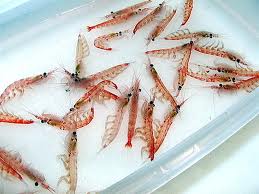 Krill, a shrimp-like crustacean, is the main food source for many seabirds, penguins, whales, and seals in the Antarctic.
Krill, a shrimp-like crustacean, is the main food source for many seabirds, penguins, whales, and seals in the Antarctic.
They collect the phytoplankton with a very fine gauge plankton net, and the zooplankton and krill with a larger gauge net. The net is lowered off the Oden's aft (back) deck with an A-frame structure and a motorized cable winch. The net is lowered to a specific depth, then raised again. The plankton and krill are caught in the net and collected in the "cod end" (bottom) of the funnel shaped net. Then these samples are preserved for study back in the United States after the cruise ends.
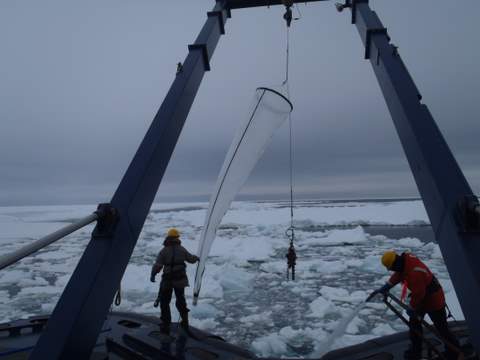 The plankton net is used to collect either phytoplankton or zooplankton and small krill from the waters around the Oden.
The plankton net is used to collect either phytoplankton or zooplankton and small krill from the waters around the Oden.
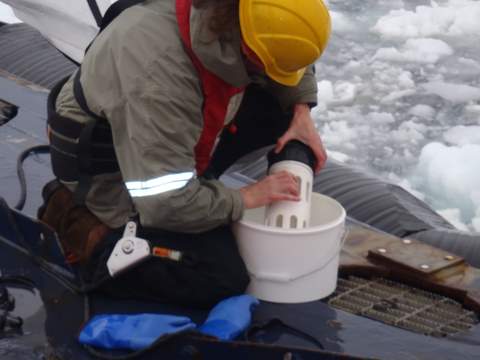 The plankton are collected in the 'cod end' of the net and then emptied into a bucket for later analysis and possible preservation.
The plankton are collected in the 'cod end' of the net and then emptied into a bucket for later analysis and possible preservation.
The Oden's seal research team is also collecting small (5mm) skin and blubber biopsies from the seals they have been studying. Rebecca and Emily will study these tissue samples to look for levels of persistent organic pollutants (POPS). They can also look at seal hair and bird feathers to use chemical tracers to learn about animals' eating habits. Carbon isotopes can show where in the Antarctic the animals are feeding, and nitrogen can show how high up on the food web (trophic scale) the animals are eating. Finally, they are also collecting snow samples and air samples to see what chemicals are entering the Antarctic food web via the air. I helped them collect snow samples when I went on my helicopter ride back in December.
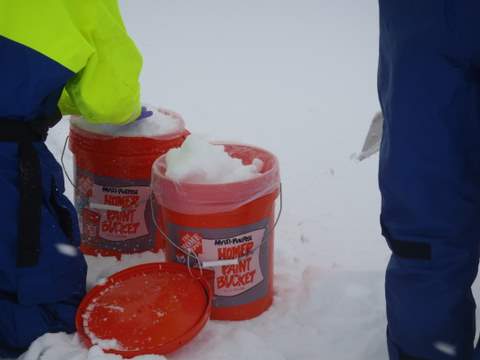 Snow is collected to be analyzed for pollutants and contaminants.
Snow is collected to be analyzed for pollutants and contaminants.
Finally, in the next few days, Rebecca hopes the seal research team can collect some whale blubber biopsies by using a long stick with a collecting tip, and going out in a zodiac to areas where the whales are surfacing a lot, and getting a sample from the skin on their backs.. I hope we will be able to watch this from the ship or from the ice at our last ice station.
I asked Rebecca to share a little about herself and her project. Here is her interview - in her own words:
Interview With A Scientist
What is your name and the name of your project? Who are the other people on your team?
Persistent Organic Pollutants in the Antarctic Marine Food Web: Impact of Climate Change and Insights into the Feeding Ecology of Apex Predators
Team Members: Rebecca Dickhut and Emily Brault
Collaborators: Seal Research Group led by Karin Harding and Tero Harkonen
Describe your job and your background/education.
I am a professor of marine science and I specialize in marine and environmental chemistry. I have a BS degree with a double major in natural sciences and math, and MS and PhD degrees in water chemistry with a minor in chemical engineering.
What questions are you trying to answer with your research?
Is climate change in western Antarctica causing contaminants stored in glacier ice to be released?
Can we learn more about the ecology of Antarctic marine mammals by using persistent pollutants as dietary tracers?
What methods will you use to collect data?
We will collect phytoplankton, krill, seal, and whale samples and analyze the samples in a lab for chemicals that tell us what the animals have eaten.
How will you know this research mission was a success?
This research mission will be a success if we are able to verify our hypothesis about the impact of climate change in western Antarctica or if we find out new information about Antarctic seals and whales that would aid conservation of these animals and their habitat.
What advice do you have for students interested in doing this kind of science?
Study both science and math. Get a college degree. Seek opportunities for internships to get experience.
What is the best part about going to Antarctica?
The beauty of the area we work in.
Is there anything else you would like to add? Antarctica is a treasure, abundant with natural beauty and we should do everything possible to keep it that way.
Lesson Learned: Asking questions is the basis for obtaining new knowledge.

